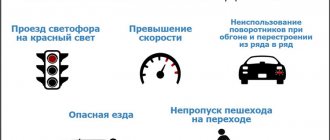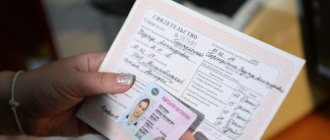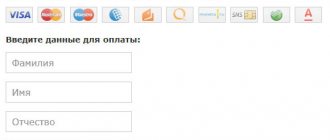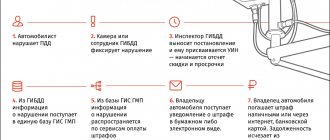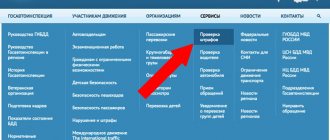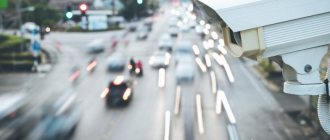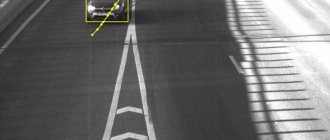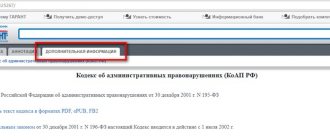What to do if the traffic police fine is overdue
Check the date on the paper order. Look at the date of the ruling. If 70 days have passed, it means the fine is overdue. For example, a traffic camera noticed that a driver crossed the stop line on October 1st. Add 70 days - on December 11 the fine will be overdue.
If there is no paper decision, check the date in the electronic one. If you don’t have the resolution on hand, you can check the date on the “Traffic Police Fines.”
On the main page, enter the license plate number of the car, the number of the registration certificate and license. If there is a fine, the service will display a resolution with all the data: date of violation, payment, unique number and method of recording the violation.
“Traffic police fines” show the date of violation and the period by which 70 days will pass
Check the overdue fine with the bailiffs. If the fine is overdue, check to see if it has gone to the bailiffs. You can check this on the service website.
Under the verification form there will be an “Advanced Search” button - click on it.
Next, fill in the empty fields with the data from your passport.
If the case has not yet been received by the bailiff, the following message will appear.
This means that the bailiffs have not yet initiated enforcement proceedings. However, you still need to pay the traffic police fine.
If the fine went to the bailiffs, information about the enforcement proceedings will appear. From the start of production, the driver has 5 days to pay the traffic police fine.
Pay the overdue traffic fine. If the payment deadline has passed, the driver owes money only to the bailiff service; the initial traffic police fine does not need to be paid. You can pay the fine on the Traffic Police Fines website.
UIN 322 - number of the resolution on collection from the bailiffs. UIN 188 - number of the resolution from the traffic police, on the basis of which the bailiffs issued a new
Notify bailiffs about payment. To prevent the bailiffs from starting work with the fine, it is better to bring the receipt for payment of the fine to the FSSP officer. The address and telephone number can be found on the notice from the bailiffs. If there is no notification, contact the district office of the FSSP in your city.
Is there a legal way to avoid paying a traffic fine?
No. According to the law, if a driver has received a punishment order, he is obliged to fulfill it within the deadlines established by law in 2021. That is, you are obliged to pay the fine assigned to you. This is what Part 1 of Article 32.2 of the Administrative Code requires.
However, there are currently loopholes in the laws that allow you not to pay a fine to the traffic police, provided that certain conditions are met and specific actions are performed. However, there are completely legal working ways to reduce the burden of paying debts (for example, large ones) by assigning such relief to them as:
- deferment of payment of a fine for a certain period,
- installment plan for payment in installments with the ability to extend the payment period without penalty,
- 50% discount for prompt payment of the assigned sanction,
- payment in installments without violating the general term.
We'll talk about all of them below.
Overdue traffic fine: consequences
If the traffic fine is not paid, the case will go to the bailiff - he will add an enforcement fee and, if the driver does not pay in this case, he will send the case to court. The judge will impose a double fine from the original, arrest or compulsory labor. Here's how it happens.
The fine will go to the bailiffs. If after 70 days from the violation the fine is not paid, the inspector will send a copy of the decision to the bailiffs. The inspector has 10 days to do this. When the bailiff receives the document, he will issue a decision on enforcement proceedings and send it to the driver. You can check the letter in the “State Post” section on State Services.
They will add 1000 rubles to the fine. After sending the document, the driver has 5 days to pay the fine, otherwise the bailiff may award an enforcement fee. If the violator misses this five-day period, he will have to pay the initial fine, plus 1,000 rubles. This is a possible punishment for failure to pay a traffic fine. He has another 70 days to do this.
The money will be debited from the account. If you miss this deadline, the bailiff will transfer the case to court. The judge will likely issue an order requiring the money to be withdrawn from the bank account.
The driver will be arrested or have his license restricted. The court may order arrest for 15 days. Failure to pay the traffic police fine on time may result in other sanctions:
- money will be deducted from your salary;
- will not be allowed abroad;
- will suspend the rights;
- will be prohibited from selling the car;
- they will send the car to the impound lot and sell it for debts - this happens during FSSP and traffic police raids on the road.
Read the detailed instructions about what will happen if you overstay the traffic police fine, what to do if the paid traffic police fine was handed over to the bailiffs, how to prove the fact of payment and appeal such a fine.
What is the penalty for failure to pay a traffic fine?
Answering the question, “Do I need to pay a fine to the traffic police?”, the answer will definitely be positive. A fine is a measure of punishment for a misdemeanor, and not just an ordinary debt. Evading a fine is a crime in itself. If you continue to ignore it, the minimum you will have to worry about is getting another fine, but this time in double the amount of what you owe. Another punishment that awaits the defaulter is 15 days in prison.
A penalty may be awarded even if the traffic police fine has already been paid, but the money was paid after the time allotted by law. Since Article 20.25 of the Code of Administrative Offenses clearly states all the conditions, and if they are violated, even the fact that the fine is closed does not relieve one from the unpleasant status of a violator of administrative law.
A conviction under Article 20.25 has many nuances. To avoid punishment, you can simply give up the driver's seat in the car for a while or drive as little as possible. Then, even if your vehicle is stopped by traffic police inspectors, no one will be able to force you to serve 15 days of punishment. In addition, the statute of limitations for the article in question is not so long. Those citizens who were issued a fine no later than three months ago, and it has not yet been repaid, should be wary. That is, you should pay attention to how long the fine in question has not been repaid.
When not to pay
The traffic police issued the violation incorrectly. Traffic police officers have regulations with their rights and responsibilities. An administrative penalty can be challenged if the inspector committed one or more violations:
- did not attract witnesses or did not record on camera information about an accident or other “road” violation for the record;
- did not indicate in the protocol all the information that is relevant to the case - the circumstances of the violation, his actions, the road infrastructure layout, the quality of the road and lighting;
- did not indicate the comments of witnesses in the protocol;
- if the decision was issued on the basis of recordings from traffic cameras, it did not take into account the technical condition of the traffic cameras, bad weather conditions, the quality of asphalt and lighting in the area;
- did not indicate in the resolution his position and surname, the date and place of the violation, the deadline and procedure for appealing.
To challenge the actions of a traffic police officer and not pay a fine, write a complaint addressed to the head of the department where the employee who made the decision works. The complaint must indicate what mistakes the inspector made and what he did not take into account when considering the case.
The driver does not admit his guilt. It happens that the camera made a mistake or the workers did not have time to remove the temporary sign, and the driver receives an erroneous fine. The most reliable way to prove your innocence is to use a video recorder or witness testimony. The recording from the camera can be attached to the complaint on a flash drive or disk.
If you did not violate, write such a complaint. The traffic police is obliged to consider it within 10 days
What happens if you don’t receive chain letters and notices of fines?
The camera may record a traffic violation, but if you have not received a notification of a fine, misunderstandings may arise. It should be borne in mind that fines issued based on camera readings do not arrive immediately. This may take some time. But what to do if there is a legal fine, but the decision on its existence was not delivered to the culprit, which is why he was unable to pay anything.
Fines from the traffic police may be sent to the old address if the driver has changed his place of residence, but did not indicate this in the vehicle registration certificate. Others deliberately try to prevent the delivery of the fine notice. For example, without signing when receiving a registered letter. Of course, there is a grain of logic in this, since it is believed that the resolution will not be able to come into force. But if this is revealed, then the offender will face even greater troubles. Therefore, it is better not to use this method of not paying traffic fines from cameras.
A letter that could not be delivered to the recipient will be stored at the post office for 30 days. Then these letters will be sent back. Once the letter is returned, the order will legally begin to work (as explained by the Supreme Court). If this happens, the violator gets another problem - he will not be able to track exactly when the regulation came into effect.
Where can I view the traffic police fine?
On the website "Traffic Police Fines". On the main page of the service, fill out the fields with the car’s license plate number and registration certificate number.
Fill in the car number, STS, license and enter your email. Mail is needed so as not to miss new fines
On State Services. First, you need to register on the portal, then confirm your account. This can also be done through banking services or at any MFC. When the registration on State Services is confirmed, you can leave data about the car in your personal account. After this, information about fines will be sent to your personal account and to the email that was specified during registration.
Latest news about the possibility of non-payment of fines from cameras
There are a number of fakes and other false or irrelevant information on this topic. The most common data concerns 2 possibilities:
- in some sources of the latest news you can find information that fines from cameras supposedly do not have to be paid - this is what the Supreme Court of Russia ruled,
- according to other sources, there is a life hack with the ability to pay only 1 ruble for a traffic police fine, thereby completely closing it.
Both of these information spreaders are fake and untrue. Let's find out why!
What fines from cameras can be waived?
Regarding the statement in point No. 1 above, this is indeed true. But it works very difficult and does not apply to all fines.
The fact is that not so long ago the Supreme Court of the Russian Federation, in fact, declared illegal some of the punishments imposed from cameras that automatically record violations. We are talking about the illegality of traffic police fines from Avtodorii - automatic fixation means that determine the average speed of a car on a site with a known distance and, thus, issue a decision in the form of a “chain letter” to the owner of the car.
But most importantly, the fine from the camera can be waived only if it is appealed with the grounds that the sanction for average speed is declared illegal. It won’t be possible to just not pay for it and put the resolution in a distant drawer. In addition, this does not apply to all fines, namely for average speed.
In our special article, we provided the procedure for appealing such “chain letters”.
You will also be interested in:
- Is it possible to get an installment plan to pay a fine and how to pay?
- New fines for speeding from January 1, 2021 - true or not?
- How long does it take for traffic police fines to expire?
Pay 1 ruble for a fine
But this is already a myth - at least for 2021. But previously, this method actually worked and allowed you to pay for a fine of, say, 5,000 rubles or even 30 thousand for just 1 ruble, after which the debt assumed the status of repaid.
This was a loophole that was the result of a “hole” in the payment system of one of the Russian banks. This loophole was quickly closed, and today it simply does not work. Therefore, if you read somewhere that you can pay for a fine in this way and remove it from the traffic police database, then this is not true. Now, when paying one ruble, the debt will not be considered repaid, and the amount will be shown minus this very 1 ruble.
Remember
- A fine is considered overdue if it has not been paid within 70 days from the date of violation.
- The consequences of an overdue traffic fine are the transfer of the case to bailiffs, to court and forced collection of money.
- To pay an overdue fine, check on the FSSP website to see if enforcement proceedings have been initiated. If not, pay the fine as soon as possible.
- If the bailiff has started the proceedings, look at the date - after 5 days from the start of the proceedings the bailiff may assign an additional fee. Then you will need to pay the amount of the fine plus a fee to the FSSP.
- If you do not pay this fine, the bailiff will refer the case to court - they may impose a double fine or arrest.
- The traffic police fine may not be paid if the inspector incorrectly completed the report or the driver has evidence of innocence. Send a complaint to the traffic police along with evidence - indications of errors or a recording from the registrar.
- You can check fines on the State Services website after registration or immediately on the “State Traffic Police Fines”.
All articles by the author: Evgeniy Lesnov
When should fines be paid?
The law clearly states how long you can legally avoid paying a fine to the traffic police, and not be afraid that you will be punished. But this period is not so long, and its countdown begins almost immediately after the traffic police inspector has issued a punishment.
First, you should try to find a legal way to appeal the inspector’s decision. But there must be a reason for this and at least a little confidence that the procedure will bring the expected results. If it doesn’t work out, there will be another 60 days left to pay the fine.
There are situations when a fine is issued not on the basis of the inspector’s testimony, but on materials from a video surveillance camera. The camera itself cannot issue a fine. Here, counting the deadlines is a little more complicated, since you need to focus not on the date of the violation itself, but on the moment when the person received an official notification of its recording.
If you have not paid the fine within 70 days, you may be prosecuted under Article 20.25. The legal validity period of the article is from one day to three months after the delay. Regardless of whether the violation was recorded by the camera or the inspector did it. Despite the fact that there is a statute of limitations for the penalty under the article for delay, even after its expiration, the fine is still active and is registered with the violator.
What to do if the bailiffs do not leave you alone even after payment
First, stop panicking: once you have paid off your debt, then nothing bad will happen. You must understand that the traffic police deal with violators first, and then the Federal Bailiff Service, and the State Traffic Inspectorate also handles all payments. Sometimes there are gaps in the interaction between these organizations. If you deposited all the necessary money in the last days of the term, then the message about this may simply not have time to reach the FSSP. In such a situation, you have the right to contact this service, explain everything as it is, take confirmation from the traffic police, and the problem will be solved.
Read What happens if you don’t pay a microloan: how to legally not pay a loan from an MFO
Statute of limitations for prosecution
Do not confuse the period established for paying a fine by the traffic police and the statute of limitations during which a person can be brought to administrative responsibility (Article 4.5 of the Code of Administrative Offenses of the Russian Federation).
Thus, a decision to hold the driver accountable is made within two months from the moment the unlawful act was committed, and if we are talking about a violation for which an act can only be issued by a court, then the period is extended by another month.
The only exceptions are a few articles from Chapter 12 of the Administrative Code. According to the specified standards, sanctions are applied over a three-year period:
- Driving a car by a driver while under the influence of alcohol or drugs, transferring control of a car to a person in a state of intoxication, Art. 12.8.
- Violation of traffic rules or rules of operation of a vehicle, resulting in the infliction of slight or moderate harm to the health of the victim, art. 12.24.
- Failure of the person driving the vehicle to comply with the requirement for medical examination. examination Art. 12.26.
- Use of alcohol, drugs or psychotropic drugs after an accident in which the driver was involved, or after the car was stopped at the request of a traffic police inspector, Part 3 of Art. 12.27.
- Violation of traffic rules by a pedestrian, car passenger or other road user (except for the driver of the car), which, through negligence, resulted in the infliction of slight or moderate harm to the health of the victim, Part 2 of Art. 12.30.
Separately, it is worth clarifying the statute of limitations for paying a traffic police fine, that is, the period during which a person may be subject to additional liability for non-payment and may be obligated to carry out the imposed penalty. Article 31.9 of the Code of Administrative Offenses of the Russian Federation determines the limitation period for execution of the decision. Paragraph 1 states that a person may not fulfill his obligation to pay a fine to the traffic police if the resolution has not been put into effect within a two-year period from the date of its entry into force.
If a citizen held accountable evades his duty, then the period is suspended. It turns out that non-compliance should not depend on the person against whom the sanction was applied.
The appointment of a deferment or installment plan also interrupts the course of the established period. This is stated in paragraphs 3 and 4 of Article 31.9.
Other payment concessions
Now let's look at legal methods that, although they give a negative answer to the question of whether it is possible not to pay a traffic police fine, can help ease the burden of payment in some situations.
Payment of half the fine
One of the simplest reliefs is the opportunity to pay half the fine. If you meet the deadline of 20 days after the ruling with a fine of, for example, 5,000 rubles, you will not have to pay half of this amount in most cases, since there will be a 50% discount.
Why is it possible not to pay the full sanction in most cases, but not in all? Because there are exception articles to this possibility. They are specified in Part 1.3 of Article 32.2 of the Code of Administrative Offences, and this includes fines for:
- repeated driving in an unregistered car (5 thousand),
- fine for deprivation of rights for intoxication, as well as for transferring control to a drunk (30,000 rubles),
- repeated penalties for speeding,
- repeating a red traffic light,
- repeated violation in the form of driving in the oncoming lane,
- re-driving backwards on a one-way road,
- for road accidents causing harm to human health,
- for refusing a medical examination,
- for the use of alcohol or drugs after an accident before the arrival of traffic police officers.
Payment of the fine in installments
If it is problematic for you to pay immediately, for example, a 30,000 ruble fine for intoxication, then within 60 days of the payment period you can pay in installments - this does not prohibit anything. Most importantly, keep your payment receipts until you return your driver's license.
Moreover, you can receive an installment plan to pay the fine by filing a corresponding application with the court. This will allow you to extend the specified 60 days, most often by several months. However, such installment plans are not given to everyone and not always - you need good reasons in the form of your poor financial situation.
Something else useful for you:
- We drove under the camera at a yellow traffic light: will there be a fine and how to appeal?
- Is it possible and how can I restore a discount on a traffic police fine if it arrives late by mail?
- How to legally avoid a fine for a “Spikes” sign?
Payment deferment
In addition to installments, a deferment is also possible - this is when you undertake to pay the fine - the entire amount at once, but after 60 days of the mandatory payment period. This opportunity is also provided by judges based on an application. But also not always and not for everyone.
Appeal against the decision
Finally, the last legal way to avoid paying a fine is obviously if you have successfully appealed it. There may be a lot of reasons for this, including unobvious procedural violations when making a decision, which you may not know about, but the official or court considering your complaint will know.
But even if the complaint is rejected, remember that in this case the deadlines, including for paying the fine, are extended. But it’s better to immediately monitor enforcement proceedings against you, because the traffic police may not know that you filed a complaint with the court and send the case to the bailiffs. In this case, you will need to bring a copy of your complaint to the bailiff to suspend the proceedings.
In order not to pay traffic fines - you need to be able to challenge them!
Is it really possible not to pay a fine?
Idealists are convinced that those who do not violate traffic rules never pay fines. Perhaps this is true in a utopian world, but driving experience in Russia shows that innocent people often fall under the steamroller of justice.
For example, a traffic police inspector decided to pester you just like that, because he didn’t like you or wanted to improve his statistics.
There are cases when technology makes mistakes and “chain letters” are sent to innocent people.
If you want to act legally, you must challenge the fine. To do this, you are given 10 days from the moment the offense was recorded.
When it comes to paying fines, deadlines play a huge role:
- If your case of late payment is being considered by the court, then it must be completed within 3 months.
If there was no meeting during this time, you can relax, because the case will simply be closed. Traffic police officers are given 2 months to send you a letter containing a violation recorded by a video recorder.
If they didn't meet this term, you can feel relieved. The main thing is to preserve evidence of violation of deadlines.
You will have to pay a fine even if the deadlines are missed. But you no longer have to be afraid of additional punishment.
It is quite possible not to pay a traffic fine only if you really did not violate anything.
The fact that an offense was recorded can be challenged both if a traffic inspector draws up a report on the spot, and if a letter is delivered to you with a camera recording.
Most likely, the case will have to be resolved in court, because the traffic police rarely cancels fines imposed on the driver.
If an inspector stops you and draws up a report on the fact of violating the rules of an accident, you need to:
- enter into the protocol facts that the law enforcement officer did not pay attention to, but which prove your innocence;
- collect evidence on the spot that you are right: photos, video from the recorder (it is better not to give it to the traffic police officer for viewing, because you may not get the video back), witness testimony;
- appear in court on the appointed day and prove that the protocol was drawn up unlawfully.
It is difficult to win a case against the state even if you have not violated anything. And if you know for sure that you have done something wrong, repent and pay the fine as soon as possible. Why do you need additional problems?
If you receive a letter like this, the first thing you should do is contact the traffic police to find out the details of the case.
If you haven’t been able to really find out anything, then in order to avoid paying a fine to the traffic police, proceed as follows:
- Send a complaint to the head of the traffic police in your area within 10 days from the date of receipt of the letter.
- If in response you receive a notification that your complaint has not been satisfied, send your complaint to the district court.
- Wait for a summons (summons).
- Appear at the court hearing on the specified date and prove that you were accused in vain.
It is not uncommon for a driver to win a case and be allowed not to pay the fine imposed because there was no actual violation.
For example, not long ago a case was considered in the Voronezh court. The driver received a “letter of happiness”, which stated that he must pay a fine for crossing a solid line and driving into the oncoming lane.
The motorist managed to prove that there was no continuous intersection, and what was qualified as “driving into oncoming traffic” was the shadow of his car.
In order to convince the court of his innocence, he ordered an examination of photographs and video materials provided by the traffic police.
But it is important for you to prove this, and not just put pressure on pity, convincing the court to believe in your innocence.
If the inspector draws up a report on the fact of committing an offense on the road specifically for the driver, then a “chain letter” is sent to the owner of the car. That's why you shouldn't give your car to people you're not sure about, because you'll have to pay the fine.
We recommend watching the following video. 5 effective ways to avoid traffic fines.
Let's watch and remember!
